css3 is an upgraded version of CSS technology. It was formulated in 1999. On May 23, 2001, W3C completed the working draft of CSS3, which mainly includes box model, list module, hyperlink method, language module, and background. and modules such as borders, text effects, and multi-column layout.

The operating environment of this article: Windows7 system, HTML5&&CSS3 version, DELL G3 computer
CSS3 introduction:
CSS3 is an upgraded version of CSS (Cascading Style Sheet) technology. It was formulated in 1999. On May 23, 2001, W3C completed the working draft of CSS3, which mainly includes box model, list module, hyperlink method, language module, Background and border, text effects, multi-column layout and other modules.
One of the major changes in the evolution of CSS is the W3C's decision to break CSS3 into a series of modules. Browser vendors innovate quickly at the pace of CSS, so by taking a modular approach, elements in the CSS3 specification can move forward at different speeds because different browser vendors only support given features. But different browsers support different features at different times, which also complicates cross-browser development.
Advantages of CSS3:
1. Reduce development costs and maintenance costs
Before the emergence of CSS3, in order to achieve a rounded corner effect, developers often You need to add additional HTML tags and use one or more images to complete it, while using CSS3 only requires one tag and can be completed using the border-radius property in CSS3. In this way, CSS3 technology can free people from the work of drawing, cutting and optimizing images. If you need to adjust the curvature or color of the fillet later, using CSS2.1, you need to draw and cut the image from scratch to achieve it. Using CSS3, you only need to modify the border-radius attribute value to quickly complete the modification.
The animation features provided by CSS3 allow developers to stay away from JavaScript when implementing some dynamic buttons or dynamic navigation, so that developers do not need to spend a lot of time writing scripts or looking for suitable script plug-ins to adapt. Some dynamic website effects.
2. Improve page performance
Many CSS3 technologies have become "replacements" for images by providing the same visual effects. In other words, when doing Web development, reduce redundant tag embedding. The number of sets and images used means that users will have to download less content and the page will load faster. In addition, fewer images, scripts and Flash files can reduce the number of HTTP requests when users visit the website, which is one of the best ways to improve page loading speed. Using CSS3 to create a graphical website does not require any images, which greatly reduces the number of HTTP requests and improves the page loading speed. For example, the CSS3 animation effect can reduce HTTP requests for JavaScript and Flash files, but it may require the browser to perform a lot of work to complete the rendering of the animation effect, which may cause the browser to respond slowly and cause user loss. Therefore, you need to think carefully when using some complex special effects. In fact, many CSS3 technologies can greatly improve page performance under any circumstances.
CSS3 will be fully backwards compatible, so no design modifications are necessary to make them continue to work. Web browsers will also continue to support CSS2.
Recommended study: "css3 video tutorial"
The above is the detailed content of what is css3. For more information, please follow other related articles on the PHP Chinese website!
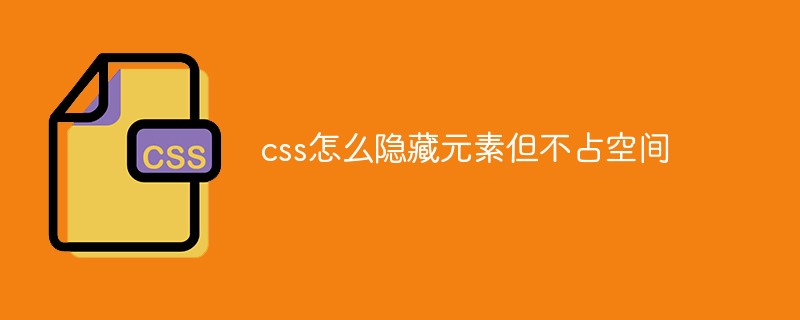 css怎么隐藏元素但不占空间Jun 01, 2022 pm 07:15 PM
css怎么隐藏元素但不占空间Jun 01, 2022 pm 07:15 PM两种方法:1、利用display属性,只需给元素添加“display:none;”样式即可。2、利用position和top属性设置元素绝对定位来隐藏元素,只需给元素添加“position:absolute;top:-9999px;”样式。
 原来利用纯CSS也能实现文字轮播与图片轮播!Jun 10, 2022 pm 01:00 PM
原来利用纯CSS也能实现文字轮播与图片轮播!Jun 10, 2022 pm 01:00 PM怎么制作文字轮播与图片轮播?大家第一想到的是不是利用js,其实利用纯CSS也能实现文字轮播与图片轮播,下面来看看实现方法,希望对大家有所帮助!
 css3什么是自适应布局Jun 02, 2022 pm 12:05 PM
css3什么是自适应布局Jun 02, 2022 pm 12:05 PM自适应布局又称“响应式布局”,是指可以自动识别屏幕宽度、并做出相应调整的网页布局;这样的网页能够兼容多个不同的终端,而不是为每个终端做一个特定的版本。自适应布局是为解决移动端浏览网页而诞生的,能够为使用不同终端的用户提供很好的用户体验。
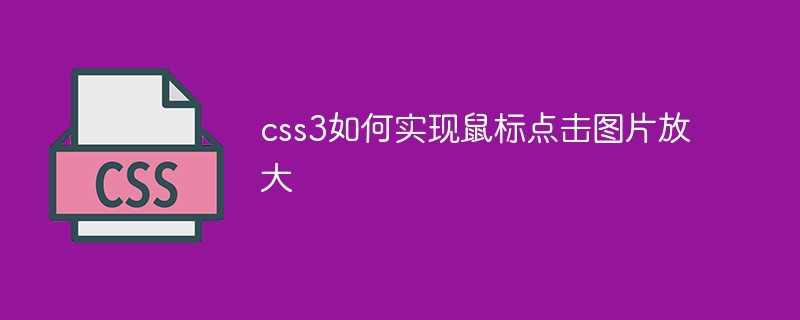 css3如何实现鼠标点击图片放大Apr 25, 2022 pm 04:52 PM
css3如何实现鼠标点击图片放大Apr 25, 2022 pm 04:52 PM实现方法:1、使用“:active”选择器选中鼠标点击图片的状态;2、使用transform属性和scale()函数实现图片放大效果,语法“img:active {transform: scale(x轴放大倍数,y轴放大倍数);}”。
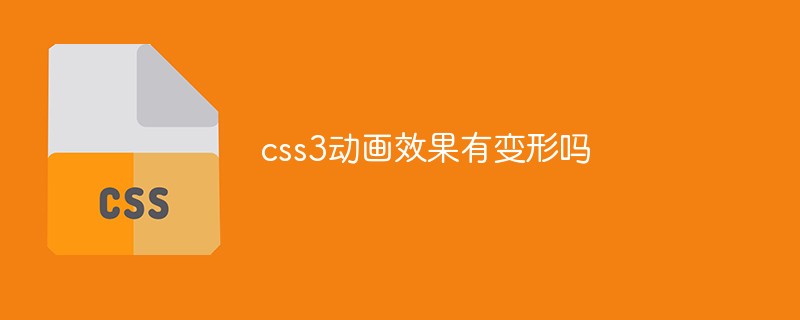 css3动画效果有变形吗Apr 28, 2022 pm 02:20 PM
css3动画效果有变形吗Apr 28, 2022 pm 02:20 PMcss3中的动画效果有变形;可以利用“animation:动画属性 @keyframes ..{..{transform:变形属性}}”实现变形动画效果,animation属性用于设置动画样式,transform属性用于设置变形样式。
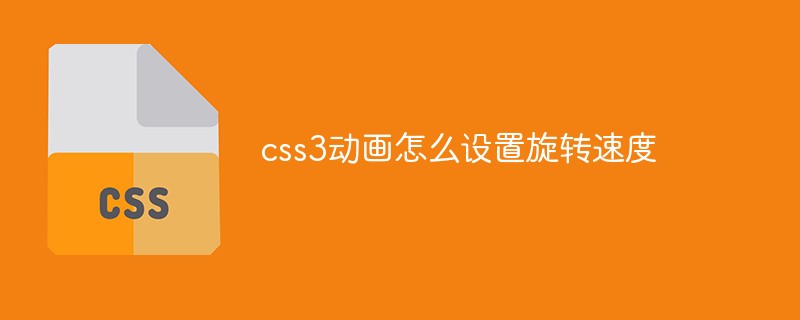 css3怎么设置动画旋转速度Apr 28, 2022 pm 04:32 PM
css3怎么设置动画旋转速度Apr 28, 2022 pm 04:32 PM在css3中,可以利用“animation-timing-function”属性设置动画旋转速度,该属性用于指定动画将如何完成一个周期,设置动画的速度曲线,语法为“元素{animation-timing-function:速度属性值;}”。
 一文了解CSS3中的新特性 ::target-text 选择器Apr 12, 2022 am 11:24 AM
一文了解CSS3中的新特性 ::target-text 选择器Apr 12, 2022 am 11:24 AM本篇文章带大家一起深入了解一下CSS3中的新特性::target-text 选择器,聊聊该选择器的作用和使用方法,希望对大家有所帮助!
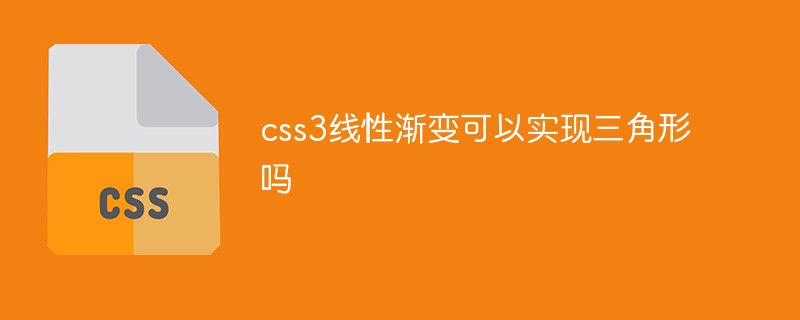 css3线性渐变可以实现三角形吗Apr 25, 2022 pm 02:47 PM
css3线性渐变可以实现三角形吗Apr 25, 2022 pm 02:47 PMcss3线性渐变可以实现三角形;只需创建一个45度的线性渐变,设置渐变色为两种固定颜色,一个是三角形的颜色,另一个为透明色即可,语法“linear-gradient(45deg,颜色值,颜色值 50%,透明色 50%,透明色 100%)”。


Hot AI Tools

Undresser.AI Undress
AI-powered app for creating realistic nude photos

AI Clothes Remover
Online AI tool for removing clothes from photos.

Undress AI Tool
Undress images for free

Clothoff.io
AI clothes remover

AI Hentai Generator
Generate AI Hentai for free.

Hot Article

Hot Tools

SublimeText3 Mac version
God-level code editing software (SublimeText3)

SublimeText3 Linux new version
SublimeText3 Linux latest version

SecLists
SecLists is the ultimate security tester's companion. It is a collection of various types of lists that are frequently used during security assessments, all in one place. SecLists helps make security testing more efficient and productive by conveniently providing all the lists a security tester might need. List types include usernames, passwords, URLs, fuzzing payloads, sensitive data patterns, web shells, and more. The tester can simply pull this repository onto a new test machine and he will have access to every type of list he needs.

WebStorm Mac version
Useful JavaScript development tools

SublimeText3 English version
Recommended: Win version, supports code prompts!






